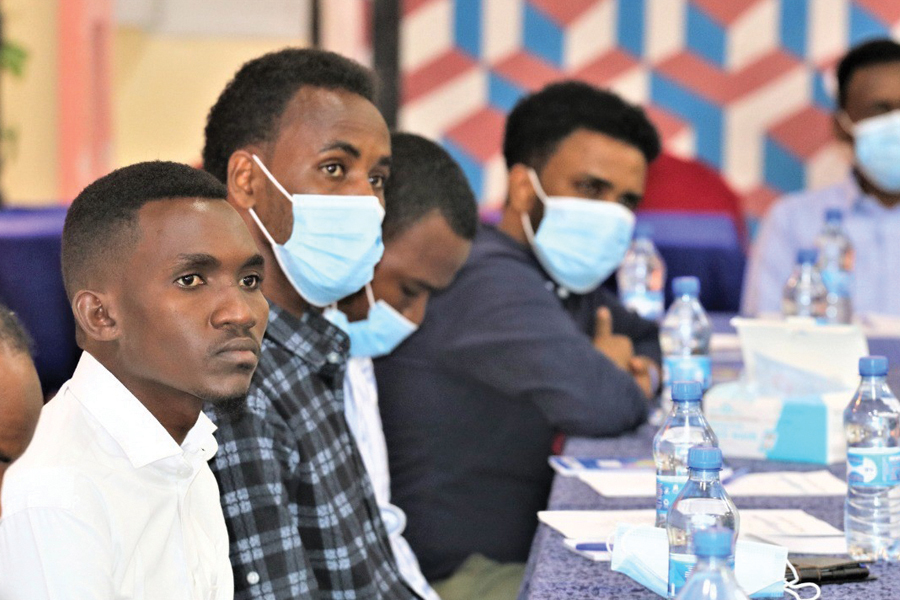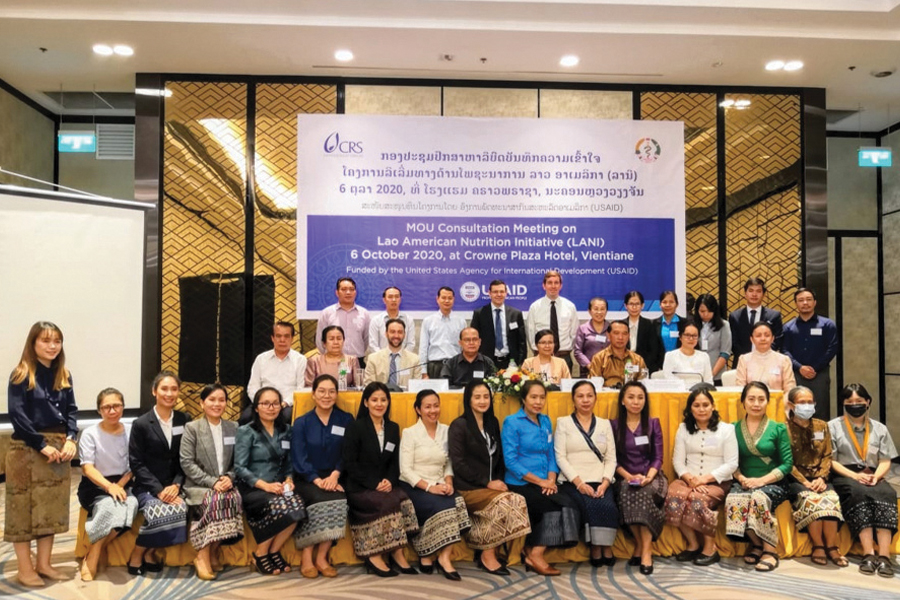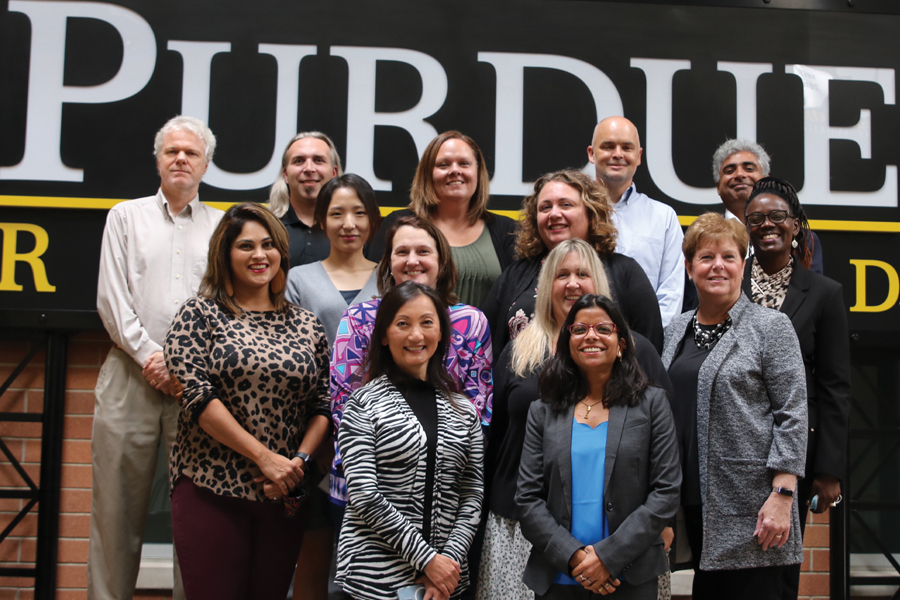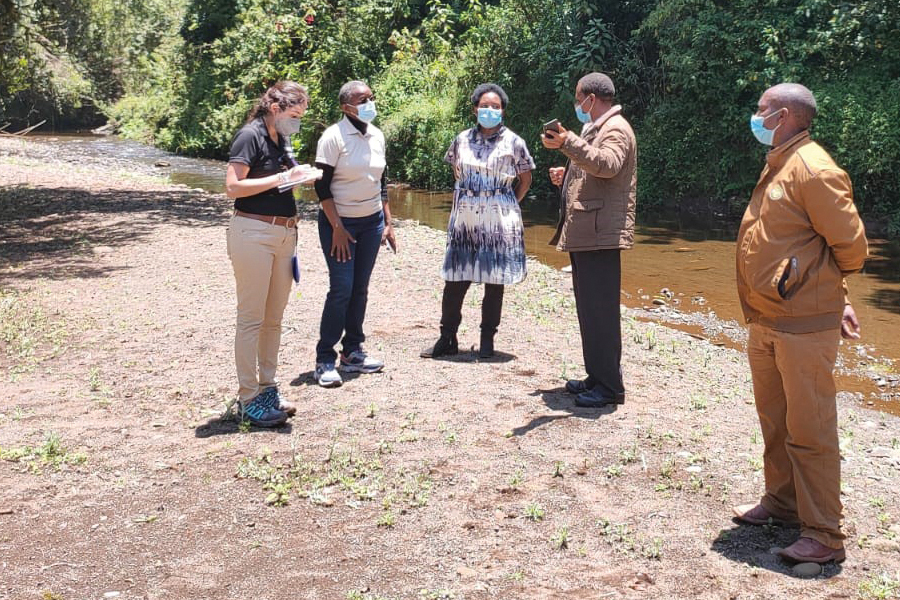Long-term Assistance and Services for Research; Partners for University-Led Solutions Engine (LASER PULSE)
In 2018, Purdue University was selected by the United States Agency for International Development (USAID) to co-create research-driven solutions for developing countries via LASER PULSE — the Long-term Assistance and SErvices for Research (LASER) Partners for University-Led Solutions Engine (PULSE).
Representing the largest single research award to Purdue’s College of Engineering, LASER PULSE is a five-year, $70 million program funded through USAID’s Innovation, Technology, and Research Hub. Purdue leads a global consortium of university and nongovernmental partners that supports USAID as it navigates developmental challenges, ultimately leading to societal, environmental, educational and agricultural improvements, in partner countries around the world.
LASER PULSE project leader Margaret Gitau (second from left), a Purdue associate professor of agricultural and biological engineering, meets with local stakeholders to discuss better water resource management in East Africa. (Photo provided)
The LASER PULSE program enables interested USAID missions, bureaus and independent offices to rapidly access a network of international universities and associated researchers to help refine and solve development challenges. LASER PULSE researchers and practitioners collaborate with the USAID offices to identify new research questions, conduct demand-driven research, translate research results into development impact, and build technical and research capacity of universities and researchers in developing countries.
LASER PULSE has built a vast network of 2,600 researchers and practitioners from more than 61 countries. These members have access to LASER PULSE’s multitude of trainings, courses, casebooks, templates, tools, and guiding documents for capacity building. In three years, more than 1,700 members have enrolled in LASER PULSE courses.

Discussion with local stakeholders in Somalia to explore improving education. (Photo provided)
As one of the largest programs in USAID’s Higher Education Solutions Network 2.0, in only three years, LASER PULSE has had a commendable impact. Via 31 projects in 15 countries, LASER PULSE has contributed to addressing key issues and positioned Purdue as a thought leader in evidence-based research for development. LASER PULSE’s influence can be seen in three main areas: conducting evidence-based research to shape national policies based on local priorities, enhancing how the U.S. government designs and executes aid projects, and building the capacity of researchers and practitioners around the world.
For example, in Kenya, LASER PULSE’s research findings have supported the Kenyan Ministry of Education in identifying and addressing challenges in its early-grade reading program and outlining essential steps to scale and sustain the program. Similar progress is underway in South Africa, where LASER PULSE’s research in human trafficking was presented to the government for policy-making consideration.

Local stakeholders meet to explore solutions to nutritional issues in Laos.(Photo provided)
Additionally, across multiple countries, LASER PULSE is supporting USAID missions in creating evidence-based designs of some of their major aid programs. For example, in South Sudan, LASER PULSE research helped inform activities to incorporate psychosocial and social-emotional skill development into education, along with literacy and numeracy.
LASER PULSE also has significantly advanced Purdue faculty and student research opportunities in critical focus areas through $8.4 million in funding. Projects led by Purdue faculty, with leaders noted, are:
- Developing research capacity of professionals engaged in alleviating malnutrition and stunting in Laos (Jerry Shively, College of Agriculture)
- Creating effective and cost-efficient models to deliver accelerated education programs focusing on learning outcomes, equitable access, and retention for all students, particularly the most vulnerable, in Somalia (Willie Burgess, College of Education)
- Addressing crucial challenges of increasing rural unemployment and of reaching rural farmers on the last mile of the input supply chain in Kenya, by providing training and credit access for youth to become entrepreneurs (Jacob Ricker-Gilbert, College of Agriculture)
- Building data-driven decision support for improved water security in Kenya, Tanzania and Uganda (Margaret Gitau, College of Engineering)
- Co-creating impactful solutions, and deploying a design thinking process for conducting participatory action research with Afar youth in Ethiopia (Lisa Bosman, Purdue Polytechnic Institute)
- Developing a systems, networks, and human-centered design approach to assessing the resilience of Ethiopian communities experiencing recurring violent conflict shocks (Stacey L. Connaughton, College of Liberal Arts)
In addition to helping faculty members meet their research objectives, LASER PULSE offers the Purdue community opportunities for partnerships with other higher education institutions and practitioners via its network. The network fosters relationships on which researchers can rely for future collaboration.
Purdue Leaders
- Arvind Raman, LASER PULSE Director; Executive Associate Dean, Robert V. Adams Professor of Mechanical Engineering, and Professor of Materials Engineering (by courtesy)
- Yuehwern Yih, LASER PULSE Academic Director; Professor of Industrial Engineering
- Pallavi Gupta, LASER PULSE Program Director
- Betty Bugusu, LASER PULSE Technical Director
Partner Institutions
- Purdue University (lead)
- Indiana University
- University of Notre Dame
- Makerere University
- Catholic Relief Services

**This story originally appeared in the Purdue University College of Engineering Frontiers, Winter 2021-2022 magazine.

